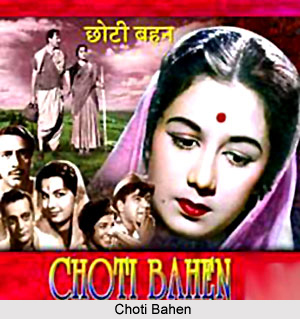 Remake films in Bollywood date back to the days of the inception of films. Dadasaheb Phalke`s 1913 production of Raja Harishchandra was remade four years later by the same director. That, of course, was in the silent era, which was overwhelmingly dominated by mythological and historical films. Later, given the fact that India was a nation where a multiplicity of languages was spoken, it was hardly surprising that inter-lingual remakes became the norm.
Remake films in Bollywood date back to the days of the inception of films. Dadasaheb Phalke`s 1913 production of Raja Harishchandra was remade four years later by the same director. That, of course, was in the silent era, which was overwhelmingly dominated by mythological and historical films. Later, given the fact that India was a nation where a multiplicity of languages was spoken, it was hardly surprising that inter-lingual remakes became the norm.
Bengali and Marathi films have always been a major source for remakes in Bollywood. In as early as 1928 Devdas was adapted from Saratchandra Chatterjee`s popular novel by the same name. This particular film first filmed in 1928 (in the silent era) by Naresh Mitra for Eastern Films Syndicate. Two celebrated Hindi versions of this story were later made by Pramathesh Chandra Barua, in 1935, and Bimal Roy, in 1955. The 2002 Hindi adaptation was directed by Sanjay Leela Bhansali.
This trend of remaking an important regional film into Hindi was common to both mainstream and parallel cinema. The audience they hoped to find were different but the motive was the same - the urge to reach the elusive high of an all-India audience. A number of films from South India were remade into Bollywood. Solva Sawan, Sargam, Ek Duuje Ke Liye, Sadma, Woh Saat Din and Eeshwar proved popular.
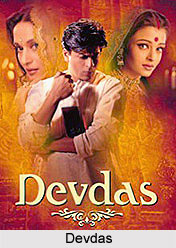 Marathi cinema`s interface with the Mumbai industry touched its pinnacle in the work of V. Shantaram, who made the provocative Kunku (in Marathi) and Duniya Na Mane (in Hindi) in 1937. This was a bilingual film about a woman tricked into marrying an old widower, who reluctantly accepts her decision not to consummate the relationship. In 1941, Shantaram made another Marathi-Hindi bilingual, Shejaril Padosi, which addressed the issue of communal harmony. In 2000, Mahesh Manjrekar`s Astitva was made both in Marathi and Hindi.
Marathi cinema`s interface with the Mumbai industry touched its pinnacle in the work of V. Shantaram, who made the provocative Kunku (in Marathi) and Duniya Na Mane (in Hindi) in 1937. This was a bilingual film about a woman tricked into marrying an old widower, who reluctantly accepts her decision not to consummate the relationship. In 1941, Shantaram made another Marathi-Hindi bilingual, Shejaril Padosi, which addressed the issue of communal harmony. In 2000, Mahesh Manjrekar`s Astitva was made both in Marathi and Hindi.
For several decades, Bengali films remained one of Hindi cinema`s most commercially reliable formulas. It combined a realistic mode of storytelling to the needs of mass entertainment in a manner that did not undermine the purity of the creative process. A case in point is Basu Parivar, directed by Nirmal Dey in 1952, which inspired the making of Ram Mukherjee`s Hum Hindustani in 1960. The film revolved around the hardships faced by a family during World War II.
One Bengali director who mastered the blending of mass popularity and artistic integrity was Asit Sen. He remade 3 of his Tollygunge hits, Chalachal, Deep Jweley Jai and Uttar Falguni, as critically acclaimed Hindi films. Sen`s first remake was that of Uttar Falguni, as Mamata in 1966, in which Suchitra Sen performed one of her best-known roles. He then adapted the story of Deep Jweley Jai for the Rajesh Khanna - Waheeda Rehman psychodrama in Khamoshi. A year later, Asit Sen made Safar, a tragic love story based on Chalachal. The cast was headed by the top star pair of the era, Rajesh Khanna and Sharmila Tagore.
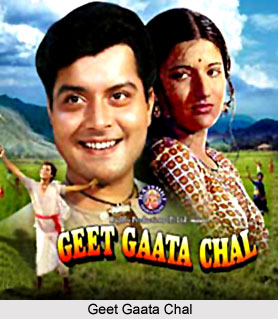 The history of Hindi remakes of Bengali films thus goes back a very long way. The 1942 Bengali film, Parineeta, based on a Saratchandra story, was remade by Bimal Roy in 1953 with Ashok Kumar and Meena Kumari playing the two pivotal roles. Another Saratchandra story yielded the Bengali film Pandit Moshai, by Naresh Mitra in 1951. It was adapted in 1975 by writer-director Gulzar in Khushboo starring Jeetendra and Hema Malini. The plot of the 1950 Bengali film Mejdidi was picked up by Hrishikesh Mukherjee in 1967 for Manjhli Didi, which featured Meena Kumari as the female protagonist.
The history of Hindi remakes of Bengali films thus goes back a very long way. The 1942 Bengali film, Parineeta, based on a Saratchandra story, was remade by Bimal Roy in 1953 with Ashok Kumar and Meena Kumari playing the two pivotal roles. Another Saratchandra story yielded the Bengali film Pandit Moshai, by Naresh Mitra in 1951. It was adapted in 1975 by writer-director Gulzar in Khushboo starring Jeetendra and Hema Malini. The plot of the 1950 Bengali film Mejdidi was picked up by Hrishikesh Mukherjee in 1967 for Manjhli Didi, which featured Meena Kumari as the female protagonist.
Tapan Sinha`s Kabuliwala, Ajoy Kar`s Saat Pake Bandha (Kora Kagaz) and Tarun Majumdar`s Balika Bodhu were remade into Hindi films. Gulzar chose the plot of Tapan Sinha`s Apanjan for his directorial debut, Mere Apne. On the other hand one of Guru Dutt`s most admired films, Sahib Bibi Aur Ghulam was based on Kartick Chattopadhyay`s Saheb Bibi Golam and Tagore`s Atithi was turned into a successful musical love story, Geet Gaata Chal, directed by Hiren Nag.
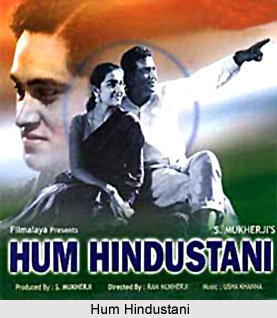 The south Indian influence on Hindi cinema was slow to begin with but has progressively grown in reach and impact. It brought a spate of family dramas and musical spectaculars into the Bombay movie mainstream; these have assumed multifarious forms over the years. The nationwide success of Chandralekha opened a new avenue for Tamil filmmaking studios. All through the 1950s, top southern producers and directors remade Tamil films in Hindi. Quite often their efforts were crowned with success. Inevitably, the southern imports brought a new sensibility into Hindi films, one that blended the rules of solid storytelling with elements to tantalize the masses.
The south Indian influence on Hindi cinema was slow to begin with but has progressively grown in reach and impact. It brought a spate of family dramas and musical spectaculars into the Bombay movie mainstream; these have assumed multifarious forms over the years. The nationwide success of Chandralekha opened a new avenue for Tamil filmmaking studios. All through the 1950s, top southern producers and directors remade Tamil films in Hindi. Quite often their efforts were crowned with success. Inevitably, the southern imports brought a new sensibility into Hindi films, one that blended the rules of solid storytelling with elements to tantalize the masses.
Tamil and Telugu producer-director L.V. Prasad`s first Hindi feature film, Sharada, a remake of the Tamil film Etbirparadathu (directed by Narayanamurthy) and the Telugu film Ilavelpu (directed by Yoganand), dealt with a subject that was rather radical for the all-India audiences of the time. The film`s male protagonist, played by Raj Kapoor, finds that by a quirk of fate he has become the stepson of the woman he loves (Meena Kumari).
Prasad`s comedy Miss Mary, like Sharada, was a remake of his own film made earlier in Tamil as Missiamma and in Telugu as Missamma. His third Hindi release was Chhoti Bahen, an adaptation of the Tamil film En Thangai. Another major Chennai filmmaker who successfully reworked his Tamil hits for the Hindi movie market was A. Bhimsingh. His best known Hindi film, Adini, was a 1968 remake of the Sivaji Ganesan hit Alayamani. Bhimsingh also remade Pasamalar as Bhai Bahen. The film featured Ganesan in the role of an orphaned young man who dotes on his sister so much that his world goes to pieces when she marries a co-worker of his.
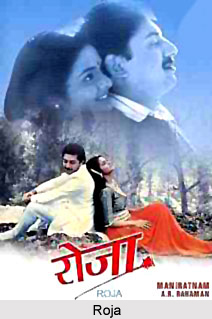 Prasad continued with his forays into Hindi cinema virtually till the very end of his filmmaking career. In 1981 he produced K. Balachander`s all-India hit Ek Duuje Ke Liye, a remake of the director`s Telugu feature Maro Charithra. The man who established the "Madras movie", or Hindi films funded primarily by southern capital, as a viable commercial option in the all-India market was T. Rama Rao. He delivered a series of smash hits in the late 1970s and early 1980s - Lok Parlok, Judaai, Maang Bharo Sajana, Andha Kanoon and Inquilab. Many of Rama Rao`s remakes featured Jeetendra as the male lead, as did the Hindi productions of Telugu directors such as K. Raghavendra Rao (Himmatwala) and Dasari Narayana Rao (Swarg Narak, Jyoti Bane Jwala, and Pyaasa Sawan).
Prasad continued with his forays into Hindi cinema virtually till the very end of his filmmaking career. In 1981 he produced K. Balachander`s all-India hit Ek Duuje Ke Liye, a remake of the director`s Telugu feature Maro Charithra. The man who established the "Madras movie", or Hindi films funded primarily by southern capital, as a viable commercial option in the all-India market was T. Rama Rao. He delivered a series of smash hits in the late 1970s and early 1980s - Lok Parlok, Judaai, Maang Bharo Sajana, Andha Kanoon and Inquilab. Many of Rama Rao`s remakes featured Jeetendra as the male lead, as did the Hindi productions of Telugu directors such as K. Raghavendra Rao (Himmatwala) and Dasari Narayana Rao (Swarg Narak, Jyoti Bane Jwala, and Pyaasa Sawan).
But the Mumbai-bound flow of southern films and their makers did not stop. The influential Tamil director Bharathiraja adapted Sigappu Rojakkal a slasher film with an overt anti-woman slant, as Red Rose in 1980, with superstar Rajesh Khanna essaying the pivotal role. K. Bhagyaraja had many of his Tamil releases cast into Hindi, notably by Telugu filmmaker Bapu. He made films like Woh Saat Din and Mohabbat. In the early 1990s, Indra Kumar remade Bhagyaraja`s Enga Chinna Rasa as Beta, starring Anil Kapoor as an illiterate. Earlier, in 1985, Bhagyaraj had wielded the director`s megaphone to make the big-budget Amitabh Bachchan vehicle Aakhri Raasta, a remake of Bharathiraja`s Tamil-language Oru Kaithiya Diary.
Today, names such as Mani Ratnam, Priyadarshan, and Santosh Sivan rank among the most respected creative artists and craftsmen in Hindi cinema. Mani Ratnam`s Roja, Bombay, Nayakan, Yuva and Guru were also made into Hindi language. Priyadarshan is perhaps the first-ever filmmaker from Kerala to establish a reputation in Mumbai. It rests primarily on Virasat, a remake of the Kamal Hassan-scripted Tamil film Thevar Magan. Most of Priyadarshan`s Hindi releases are adaptations of hits made in his native tongue, Malayalam language. Gardish, Yeh Teraa Ghar Yeh Meraa Ghar, Hulchul, Bhool Bhulaiya and others have been inspired from the Malayalam films. Other films like Nayak, directed by Shankar, Telugu movie Tholi Prema and others have been remade into Hindi blockbusters.
Though some of the biggest hits of the past few years, such as, Hum Aapke Hain Kaun, Dilwale Dulhaniya Le Jayenge, Dil To Pagal Hai, Kuch Kuch Hota Hai, Hum Dil De Chuke Sanam, Lagaan, and Gadar - Ek Prem Katha have banked upon indigenously developed plots. Apart from the Indian film industries the remake films in Bollywood were also modelled on Hollywood movies.